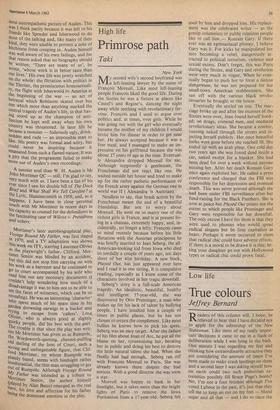High life
Primrose path
Taki
New York
My second wife's second boyfriend was a left-leaning lawyer by the name of Francois Moreuil. Like most left-leaning people Francois liked the good life. During the Sixties he was a fixture at places like Castel's and Regine's, dancing the night away while seething with revolutionary fer- vour. Francois and I used to argue over politics and, at times, over girls. While he was going out with the girl who eventually became the mother of my children I would invite him for dinner in order to get near her. He always accepted because it was a free meal, and I managed to make an im- pression on his girlfriend because she was about 17 years of age at the time. Eventual- ly Alexandra dropped Moreuil for me. Although supposedly a gentleman, the Frenchman did not react like one. He waited outside her house and tried to make up for the rather pathetic performance of the French army against the German one in world war II ( Alexandra is Austrian).
Needless to say, that brash action by the Frenchman meant the end of a beautiful friendship. But not to worry about Moreuil. He went on to marry one of the richest girls in France, and is at present liv- ing in a chateau, extremely happy, and, in- cidentally, no longer a lefty. Francois came to mind recently because before his little flirtation with the Austrian principessa he was briefly married to Jean Seberg, the all- American-looking kid from Iowa who died so sordidly a couple of years ago, ten days short of her 41st birthday. A new book, Played Out, has just appeared over here and I read it in one sitting. It is compulsive reading, especially as I knew some of the characters involved in her tragic downfall.
Seberg's story is a full-scale American tragedy. An idealistic, beautiful, healthy and intelligent 17-year-old, she was discovered by Otto Preminger, a man who makes up for his lack of talent by bullying people. I have insulted him a couple of times in public places, but he has not chosen to return the compliment. Like most bullies he knows how to pick his spots. Seberg was an easy target. After the failure of his film about Joan of Arc, he put all the blame on her, tyrannnising her, berating her in public and doing his best to destroy the little natural talent she had. When she finally had had enough, Seberg ran off with Francois Moreuil to Paris. She was already known there despite the bad notices. With a good director she was soon a star.
Moreuil was happy to bask in her limelight, but it takes more than the bright lights of Paris to remove the Iowa Puritanism from a 17-year-old. Seberg felt used by him and dropped him. His replace- ment was the celebrated writer — as the gossip columnists or public relations people like to call him .— Romain Gary. If there ever was an egomaniacal phoney, I believe Gary was it. For kicks he manipulated her into becoming a rebel, dangerously at- tracted to political terrorism, violence and sexual excess. Don't forget, this was Paris during the Sixties, and Gary and revolution were very much in vogue. When he even- tually began to push her to form a liaison dangereuse, he was not prepared for her small-town American stubbornness. She ran off with the various black revolu- tionaries he brought to the house.
Eventually she settled on one. The mar- riage broke up and after the excesses of the Sixties were over, Jean found herself hook- ed: on drugs, criminal men, and outdated revolutionary ideas. She became a zombie, running naked through the streets and in- jecting herself publicly. Her once beautiful looks were gone before she reached 30. She ended up with an arab pimp. One cold day two years ago she was found dead inside a car, naked except for a blanket. She had been dead for over a week without anyone missing her. After her death Romain Gary once again exploited her. He called a press conference and charged that the FBI was responsible for her depression and eventual death. This was never proved although she had been under FBI surveillance after her fund-raising for the Black Panthers. She is now at peace but Played Out points out the extent to which people like Preminger and Gary were responsible for her downfall. The only excuse I have for them is that they were used to phonies who would spout radical slogans but be firm capitalists at heart. Perhaps it never occurred to them that radical chic could have adverse effects. If there is a moral to be drawn it is this: let- ting your daughter go out with Hollywood types or radical chic could prove fatal.






































 Previous page
Previous page